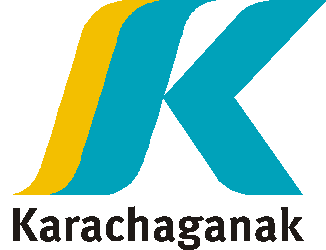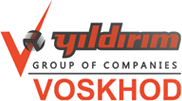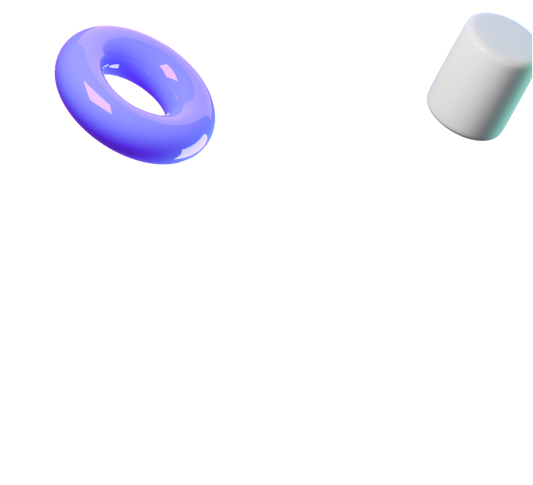
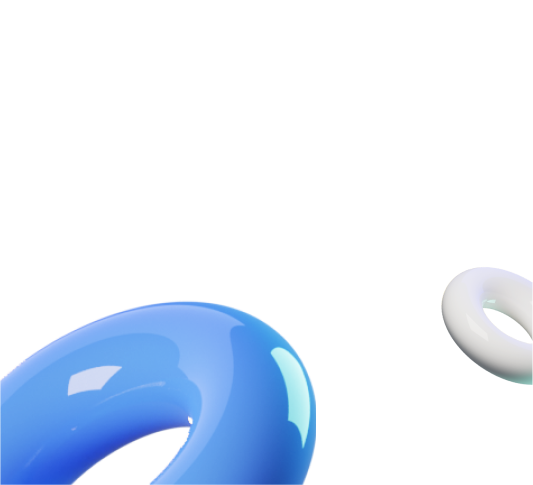


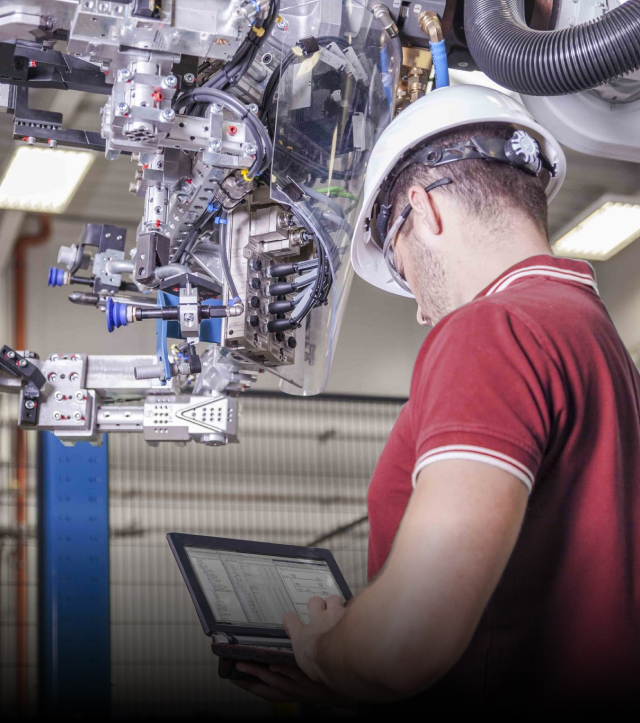



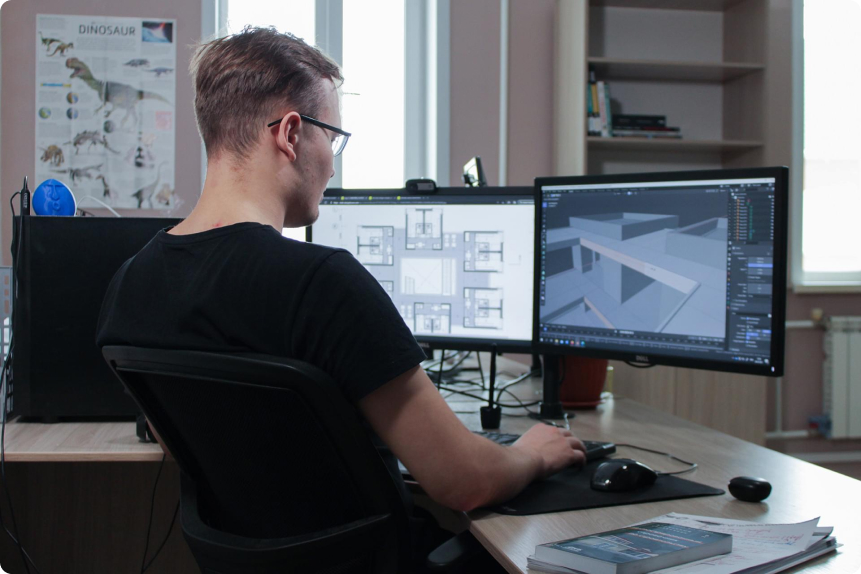
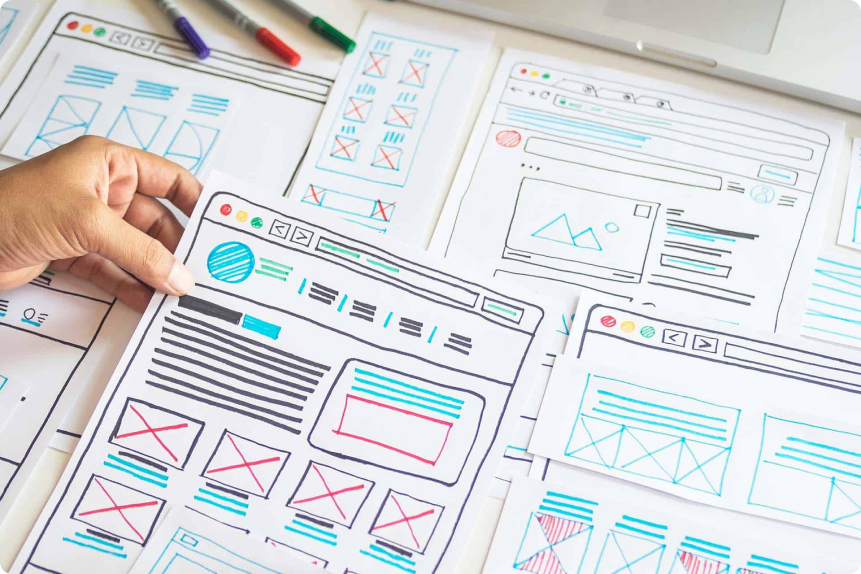
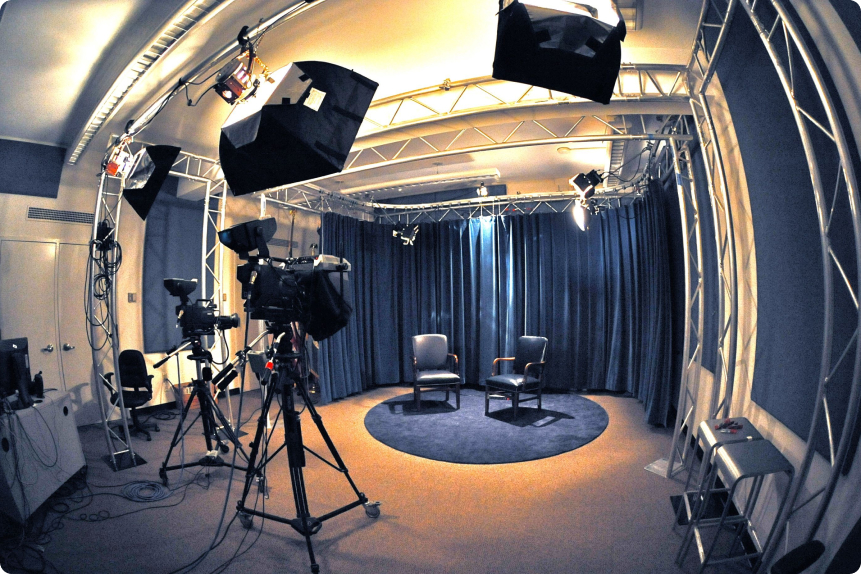
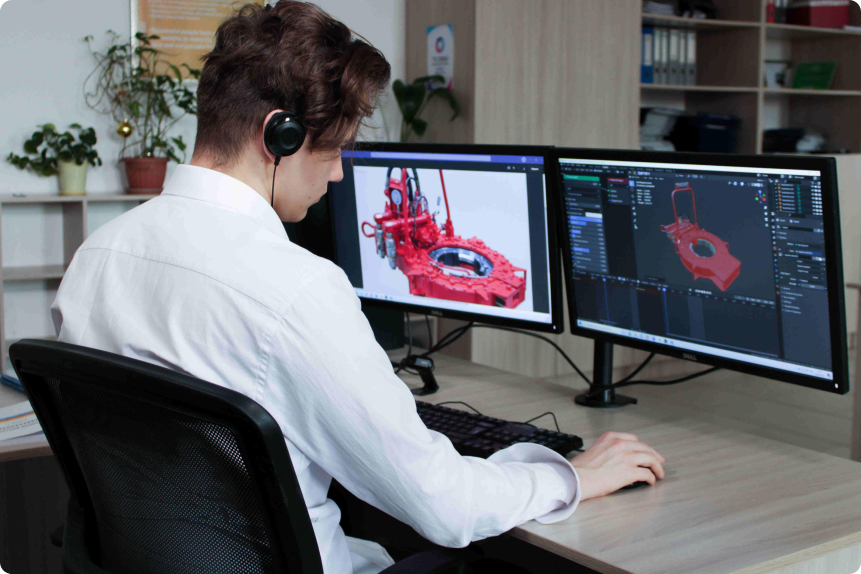
- Voice acting and musical instruments recording
- Sound mixing and processing
- Sound overlay
- Music design
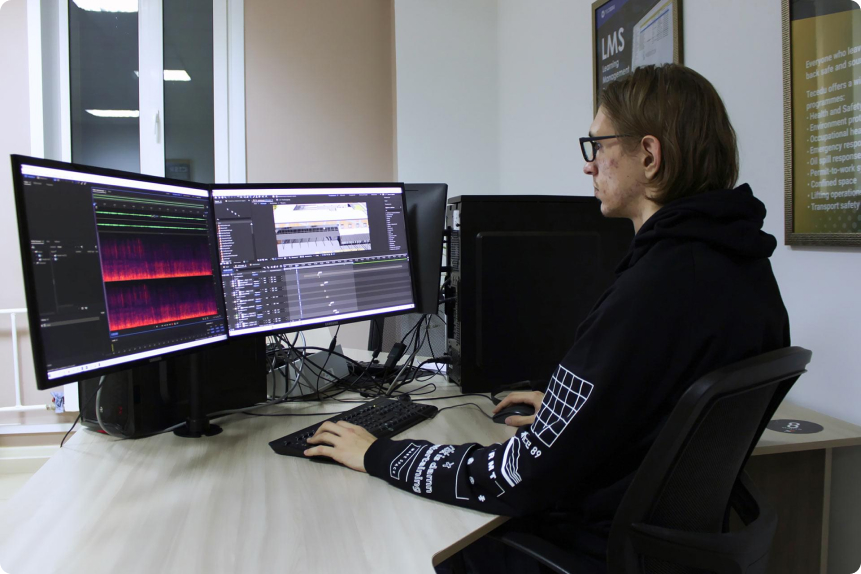
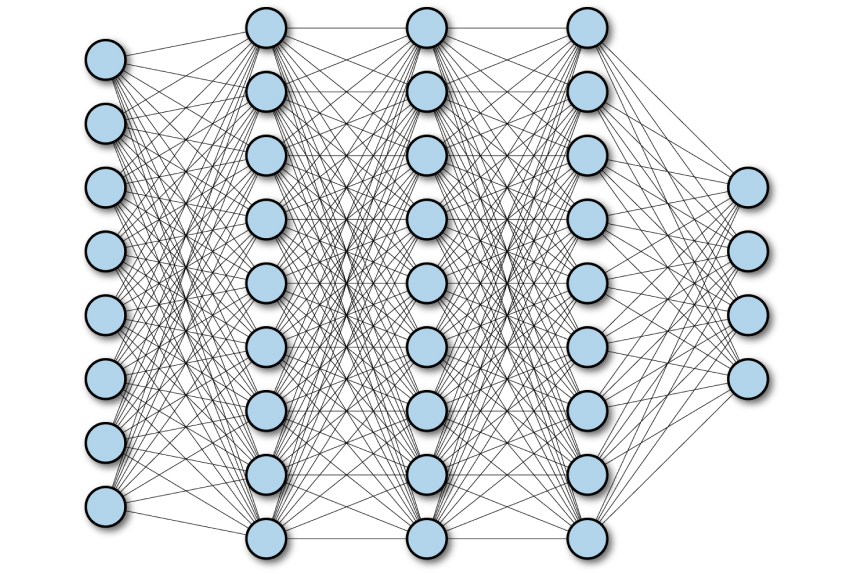
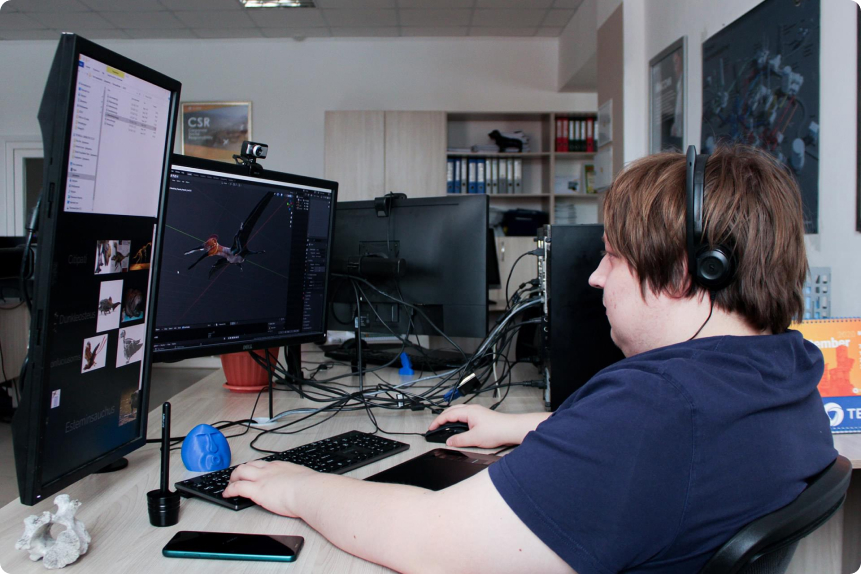
When converting a training program into electronic format, the following conversion indices should be taken into account:
| Training subject | Training duration in the classroom | Training duration online |
|---|---|---|
| Business related subject | 8 hours | 1 hour (2 slides per minute) |
| Technical course | 8 hours | 2 hours (2 slides per minute) |
To calculate the development cost for your e-learning course, you need to take into account its duration and level of interactivity. Normally, it will take 130 development hours for 1-hour long e-learning course (90-120 slides). The average cost of 1 hour of e-learning course development is from 50 to 70 US dollars.
Levels of interactivity
- Level 1 - Basic: This is a simple e-learning program similar to an automated PowerPoint presentation, sometimes referred to as click-to-read. There may also be simple quizzes and similar forms of knowledge testing.
- Level 2 - Intermediate: This is an e-learning program that combines click and read content with learner interactions such as drag and drop, tabbed interactions, timelines, etc. There are a limited number of branches at this level of the program. This level could be considered typical of most e-learning courses produced today.
- Level 3 - Advanced: These programs include a significant amount of branching, gamification, animation and / or customization for a unique end product.
E-learning speeds up the learning experience for learners who learn at a faster pace, saving time and resources for maximum efficiency.
- E-learning allows learners to test material they have already learned, which also saves time;
- During e-learning, the learning process takes place in a controlled and safe environment;
- During e-learning, knowledge is tested through tests and interactive assignments for a more objective assessment;
- E-learning can reduce training costs if the training programme is standard and can be reused.
The e-learning course is composed from the following materials:
- Text
- Images
- Documents
- Video
- Voiceover (150 words per minute)
- Tests
- Animations
- Interactive exercises and assignments
Materials are developed and transmitted to the client in SCORM / AICC formats or a project of one of the programs for the development of electronic courses such as Rise, Lectora and others, depending on the client's preferences.
Normally, training statistics is transmitted to client's learning management system (LMS), including the launch of the course, time, success, test results, etc.
Courses are usually adapted to be played from a variety of devices including a personal computer, smartphone, tablet, etc. Also important is support for various operating systems such as Windows, Android and iOS.
| Category | Risk | Risk mitigation measures |
|---|---|---|
| Health and safety | Limited access of Tecedu personnel to customer's work sites to study the real working environment, equipment operating conditions, work processes. |
Maximize the use of remote work tools to study work processes and the environment of equipment operation using video and photo materials. Tecedu personnel receive the required HSE training for site visits. |
| Operational | Delays in project implementation | Active project management and involvement of the project manager on the part of the customer / client at all stages of the project |
| Workload of key technical experts | Involvement of alternative experts with similar professional experience from the Tecedu database | |
| Lack / limited access to the required technical documentation | Preliminary discussion with the customer / client of the necessary equipment for the implementation of each stage of the project and determination of the timing and sources of information provision. | |
| Financial | The occurrence of unexpected expenses and exceeding the original budget |
Phased implementation of the project and payment for the work performed. Obtaining preliminary approval for all unforeseen expenses from the contract manager of the client company |
| Business | Change in client's strategy / approach to the project | Documentation of all changes during the implementation of the project with an estimate of the corresponding financial costs |
| Change of customer / client representative (contract manager) | Obtaining documentary confirmation from the customer about the change of the official representative. | |
| Information security and use of copyright |
Use of licensed software by Tecedu employees and advanced IT infrastructure such as Microsoft Azure, SharePoint, Exchange, Amazon Web Services, etc. Documenting the transfer of non-exclusive copyright to the customer for the use of Tecedu intellectual products and software. |
|
| Changes in approaches to project financing and budget management | Implementation of the project in phases with prepayment for each stage of the project. | |
| Difficulties in communication with representatives of the customer / client | Regular online or offline meetings and discussions with the project team from the client / contractor. |
To implement the project to create an e-learning course, the following materials and resources will be required:
| Resource | Objective | Responsible |
|---|---|---|
| Technical maintenance and operation experts | To describe the physics, structure and principles of equipment operation. | Client / Tecedu |
| Technical training instructors | Development of a training program and methodology for assessing knowledge. | Client / Tecedu |
| HSE engineers | Assessment of compliance with health and safety requirements | Client |
| Technical documentation | Study of the internal and external structure, principles of operation, maintenance and repair of equipment | Client |
| Equipment drawings | Creation of 3D models of equipment | Client |
| Photos of equipment and production facilities where the equipment is operated and repaired | Creation of the precise working environment | Client |
| Customer LMS | Testing the functionality of the e-learning course in the Customer's LMS | Client |
| Programmers and 3D modelers | Development of 3D models, software and setting up the interaction between hardware and software. | Tecedu |
| Potential e-learning course users | Testing different versions of the curriculum for interactivity, usefulness and effectiveness | Client |
E-learning course development process
Analysis
- Identification of tasks and conducting a virtual workshop with the customer's project team
- Definition of KPIs
Design
- Development of the project schedule and roadmap
- Determination of the scope for visualization
- Approval of the e-learning course structure
Development
- Training materials development
- Training materials approval
- Tests and examination materials approval
- Development of 2D and 3D models and animations
- Course prototypes development and review with the students and customer's experts
- Development of alpha and beta versions of the course with testing and evaluation
- User acceptance testing
Implementation
- Course transfer to the customer
Gamification is the use of game principles and technologies widespread in computer games in order to increase the involvement of students into the learning process.
Unbundling or “atomization” is the breaking down of courses, texts and other educational materials into minimal blocks of knowledge (atoms), which allows you to collect personalized educational materials and programs that will correspond to the current interests and level of knowledge of students.
“Atomization” facilitates the transition to adaptive learning by allowing students to study topics interesting to them anywhere and anytime. For example, read a short article or watch a training video while on the road.
Adaptive learning is a teaching method in which computer algorithms are used to manage student interactions and provide appropriately matched resources and learning activities to meet their unique learning needs.
In this case, preliminary testing on all important topics and sub-topics of the training course will allow determining the current level of knowledge of the student and adjusting his training program, excluding topics already known to the student from the training. The student will have the opportunity to complete the modules of interest in any case, but topics that he / she already knows well will be counted as completed. Thus, more prepared students will be able to concentrate on less studied or more complex topics.
| Beginning - determining the current level of knowledge of the student | Baseline assessment |
| Topic/Module 1 |
|
| Topic/Module 2 |
|
| Topic/Module 3 |
|
| End of the course | Final assessment |
Competencies are a set of skills, knowledge and values necessary for the successful completion of certain jobs. Matrices of technical competencies are created based on an analysis of existing job descriptions and technical regulations. Technical competence matrices are agreed with the customer's experts. Competency-based learning is based on technical competency matrices and aims to achieve the competencies represented in these matrices. Evaluation of the effectiveness of training is made by comparing the current and desired levels of student competence.
Our software automates the entire assessment procedure and presents its results in a convenient for decision-making format. The system can generate individual training and knowledge assessment reports.
Introduction
- Introduction of delegates
- Prototyping process discussion
- Workshop agenda review
- E-learning capabilities review
Learning objectives
- Desired training behavioral objectives discussion
- Discussion of the environment in which the training takes place, readiness for e-learning (hardware / software, availability of the training server - Internet / intranet, Java, Flash, browsers, etc.).
- Learning success criteria review
- Previous project is this area
- Presentation of the employee who recently attended the training, feedback from other representatives of the customer
- Development of the strategic learning objectives map
Brainstorm
- Revision of aim and objectives for the first prototype
- How to identify which skills to train
- The importance of learners motivation
- The use of the design elements to support motivation for learning
- Determination of the key elements of learning
- Development of the first prototype
- Determine the methods of building interactions with the learners
- First prototype review and discussion
- Discuss how the prototype can be improved
- Further actions plan
Delivery platform, assessment, control and results records
- Discussion of available delivery options for the e-learning course and potential limitations
- Determine of what should be assessed
- Determine assessment system
- Discussion of the ways to determine learning progress results
Documenting tasks
- Defining roles and responsibilities
- Documenting tasks
Detailed project plan development
- Revision of the process of creating a complete course (tasks, solutions, prototypes, media integration, development of alpha, beta versions and the final product)
- Technologies for receiving feedback from users
- Description of the ideal solution from the customer's point of view.
Limitations
- Project budget and schedule
- Access to experts and content
- Project team, approvals, decision making
Visualization and media content
- Different approaches to the use of media content, discussion of pros and cons
- The opinion of the customer's representatives on how the course should look like
- Discussion of sound, video, animation (2D and 3D)
- New content and development of existing content
Final strategy
- Project risks analysis
- Discussion of expectations for the project implementation plan
- Other questions
Key phases of the e-learning course development:
- Proofreading and text adaptation for learning purposes
- Design development
- Course storyboarding
- Exercises scenarios writing
- Animation and visual effects development
- Voice acting
- Compilation of the course
- User acceptance testing
- Course transfer to the customer




